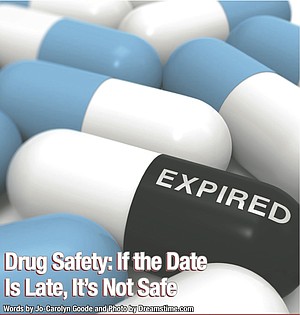1/5/2018

Coming into a new year we all get this sense to throw out the old and welcome in the new. We rumble through our closets tossing out anything we didn’t wear in the past year and/or those items we wondered why we purchased them in the first place. Next, we raid our freezers and pantries tossing out items that maybe freezer burned or have been on the shelf way past their prime. But as we go through this renew and refresh process, how many think to clean out the medicine cabinet? Tucked away in there probably are some prescriptions and over-the-counter drugs that have expired. Check the date because if it’s late, it’s not safe.
The U.S. Food and Drug Administration, the government organization that is responsible for protecting and promoting public health through the control and supervision of food and drug safety, started requiring that both prescription and over-the-counter drugs have a clear expiration date shown in 1979. That date is extremely important for a number of reasons. “It is the date that guarantees you the most efficacy of that drug according to the FDA,” said Creaque Charles, Pharm. D., BCGP. “If you take it outside that date the drug can potentially lose its potency.” If a drug loses its potency it is ineffective.
Another thing to look at with drug safety is the way the medication is stored. Pay attention to those stickers that are on your prescribed drug. For the most part, drugs just need to be stored in a cool, dry place. But then there are those drugs that require refrigeration or storage out of direct sunlight because the chemical makeup of the drug could change. If a drug is not stored properly, undesired side effects may occur and negatively affect your path to better health.
Generally speaking, over-the-counter drugs are going to be more useful longer than prescription drugs. Suspension medications will expire the quickest out of prescribed drugs. In our conversation with Frank North, Pharm. D., MPA, RPH, he said suspension drugs start off as powders and the pharmacist reconstitute them with water. They are then stored in the refrigerator to help slow the breakdown process of the drug. “Usually they expire in 14 days,” said Dr. North. Once a medication breaks down the active ingredient becomes less and less detectable.
With all these situations that can happen with taking medicine, it is crucial to talk with your pharmacist about all drugs that you ingest, both prescribed and over-the-counter. “The pharmacist is a wealth of knowledge in terms of medication therapy management. They are making sure what you are taking is appropriate,” said Dr. North. Oftentimes a lot of these problems can be avoided by asking the right questions. Both Drs. Charles and North agree that patients don’t ask enough questions or they don’t ask the right questions. Of course, they offer up some great questions to ask with every new prescription.
*What time of day should I take this medicine? Depending on a drug’s side effects the time of a day a medication is taken is important. You wouldn’t want to take a drug that will make you drowsy in the middle of the day.
*What happens if I miss a dose? The general rule is to take the dose as soon as you remember you missed it. Unless your next dose is really close. Dr. North advises his patients that if their next dose is within two-to-four hours to wait and just miss that dose and then pick up with their regular schedule of the medication.
*Where should I store the medication? Improper storage could make a drug become ineffective. Read your labels and/or ask your pharmacist if in doubt.
*How should I feel when taking the medication? You want to know how you should feel to know what is normal. If you feel anything different you may be having a bad reaction to the drug in which case your doctor and pharmacist can find a medication that works better for you.
So you have gone through your entire medicine cabinet and you’re ready to toss out your expired drugs. The first thought might be to flush them. Don’t do that. Dr. Charles said since certain drugs may be biohazardous it is safer to not flush them to avoid potential problems like water pollution. This is also why the FDA advises to not use this method as well. It has gotten to the point where Texas even requires that medications have ‘Do Not Flush’ labeling according to Dr. North to prevent such incidents.
The FDA offers a step-by-step way to dispose of drugs.
*Mix – Mix medicines with an unpalatable substance such as dirt, kitty litter, or used coffee grounds.
*Place – Place the mixture in a container such as a sealed plastic bag.
*Throw – Throw the container in your household trash.
*Scratch Out – Scratch out all personal information on the prescription label of your empty pill bottle or empty medicine packaging to make it unreadable, and then dispose of the container.
Also be on the lookout for 'Take Back Medicine Day' events. Sponsored by the DEA, these events provide an opportunity for Americans to prevent drug addiction and overdose deaths. The next Take Back Day is scheduled for April 28, 2018, or visit the U.S. Department of Justice Drug Enforcement Administration Diversion Control Division website (apps.deadiversion.usdoj.gov) to locate a year-round authorized collector in your area.
Get 2018 started off the healthy way by disposing of expired drugs and utilizing your pharmacist for drug management. Remember if the date is late, it’s not safe.


